Beyond Curriculum
Outbound Trips
Slide 1
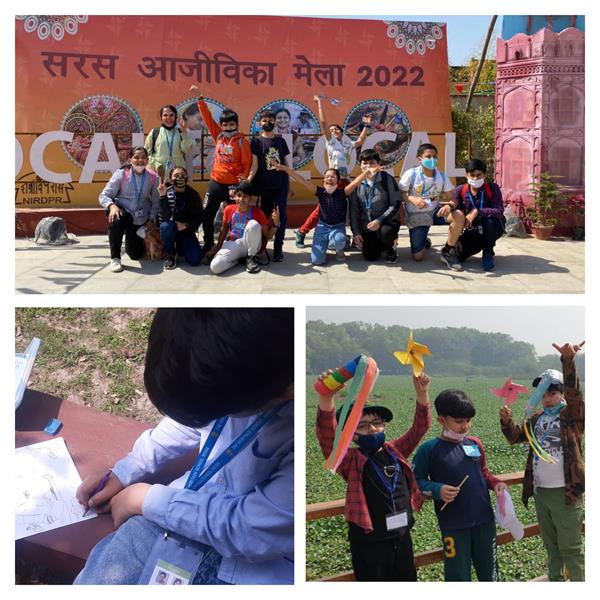
Historically, language emerged with the need to coordinate human activity, which in turn brought about further levels of sophistication in the kinds of activities human beings engaged in, further leading to the idea of skill training and character shaping as communities and societies evolved. On this evolutionary principle is based the premise of our outbound trips program wherein children learn to cross personal limits as they challenge the physical boundaries without, in collaboration with each other and the other members of the community they interact with.
Slide 2
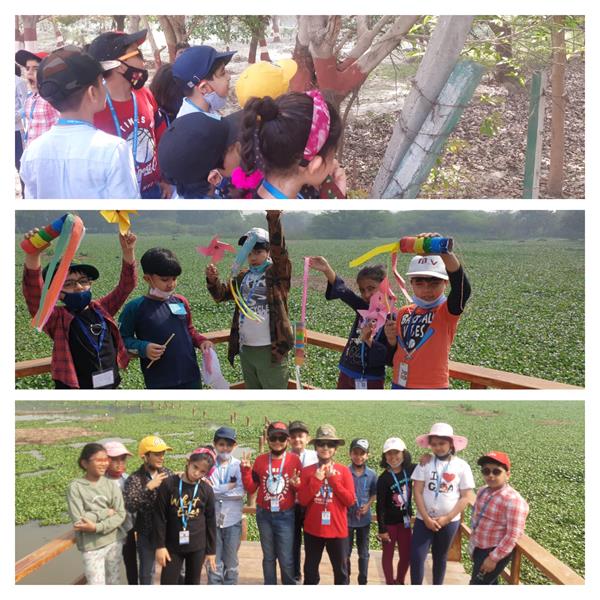
The nature of these outbound trips ranges from adventurous to cultural and historical. Accordingly, children explore different habitats, communities and cultures in their learning encounters. Engaging with authentic problems across the contexts of these trips not only needs effective communication and leadership skills, but in fact facilitates development of these skills as children learn to coordinate activities and to deal with real-life problem situations. It further leads to developing skills of strategic thinking, negotiation, entrepreneurship, resource conservation, independence and interdependence.
Slide 3
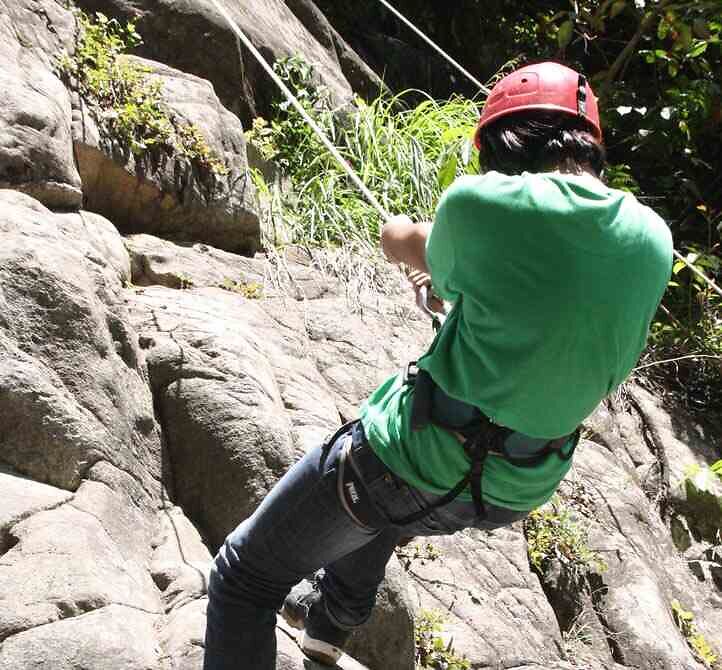
Thus, the design of our outbound trips includes the following components in which children are engaged right from the outset, irrespective of the nature of the trip: Goal Setting, Planning and Organisation, Group Work and Task Initiation, Reflection and Task Steering, and Presentation/Community Service Outcome project.
Apart from these, there are international trips such as those to NASA, Cern, and the French Exchange Program, etc that have a qualifying criteria for students to further develop excellence and strive for advanced levels of understanding.
Apart from these, there are international trips such as those to NASA, Cern, and the French Exchange Program, etc that have a qualifying criteria for students to further develop excellence and strive for advanced levels of understanding.
Slide 4
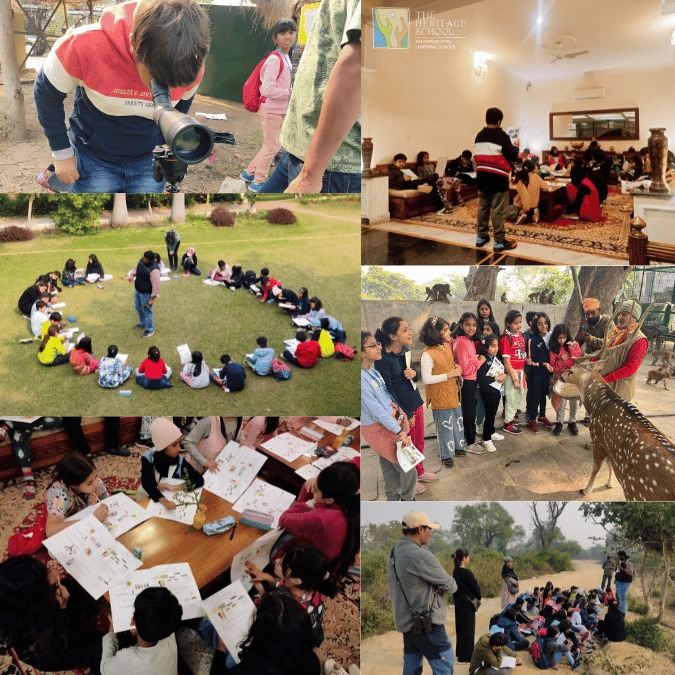
Grade 4 students recently explored the Keoladeo National Park (formerly known as the Bharatpur Bird Sanctuary) marveling at its avian diversity. Keoladeo National Park is a famous avifauna sanctuary in Bharatpur, Rajasthan, India, that hosts thousands of birds, especially during the winter season. The 3 day Khoj programme unveiled a vibrant tapestry of both residential and migratory birds. Enthusiastically armed with binoculars, the young birdwatchers identified species like the graceful Sarus Cranes, elegant Painted Storks, and colorful Kingfishers. The sanctuary's serene lakes and lush surroundings provided an ideal backdrop for their observation and documentation. This hands-on experience not only enriched their understanding of local ecosystems but also fostered a deep appreciation for the need to preserve natural habitats.
Staying and working in a team not only helped them achieve their learning goal using various skills but also made them independent and resilient. They learned to take care of themselves and each other, emerging as more self-reliant individuals. The students returned with cherished memories and newfound knowledge about the fascinating world of feathered inhabitants of the planet.
Staying and working in a team not only helped them achieve their learning goal using various skills but also made them independent and resilient. They learned to take care of themselves and each other, emerging as more self-reliant individuals. The students returned with cherished memories and newfound knowledge about the fascinating world of feathered inhabitants of the planet.
Slide 5
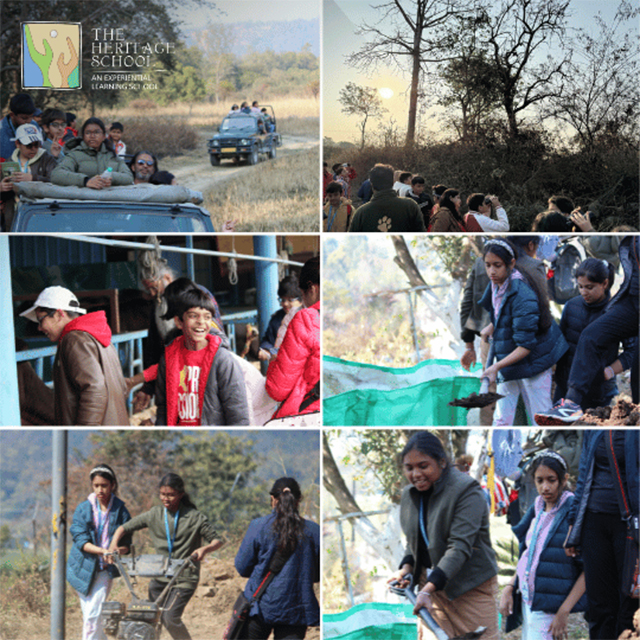
A group of Grade V students embarked on an exciting trip to Jim Corbett, Uttarakhand, beginning with a visit to a dairy farm in Kotabagh. They observed the intricacies of dairy farming, from milk extraction using machines to the production of ghee. The farm visit also included the delightful experience of savoring fresh buttermilk.
The following day, students explored a vast farm with mango orchards and mustard crops after an early stroll in the woods. Another farm emphasized organic farming principles, with the students actively participating in sowing onions and engaging in practices like manual and machine-assisted ploughing, watering and vermicomposting. Guided by safari experts, the students enjoyed a thrilling Jungle Safari at Jim Corbett National Park, spotting deer, tiger paw prints, jackals, and various birds like parakeets and black kites.
Towards the end of the programme, students engaged in bird watching, identifying species such as the red-vented bulbul, black kite, kingfisher, Himalayan bulbul, roofers treepie, house sparrow, and black crested bulbul. During morning and evening circles, they enthusiastically shared and documented their learnings and experiences that were fun-filled and enriching. Overall, the excursion led to broadening the children's horizons, fostering in them a strong sense of teamwork and value of self-care.
The following day, students explored a vast farm with mango orchards and mustard crops after an early stroll in the woods. Another farm emphasized organic farming principles, with the students actively participating in sowing onions and engaging in practices like manual and machine-assisted ploughing, watering and vermicomposting. Guided by safari experts, the students enjoyed a thrilling Jungle Safari at Jim Corbett National Park, spotting deer, tiger paw prints, jackals, and various birds like parakeets and black kites.
Towards the end of the programme, students engaged in bird watching, identifying species such as the red-vented bulbul, black kite, kingfisher, Himalayan bulbul, roofers treepie, house sparrow, and black crested bulbul. During morning and evening circles, they enthusiastically shared and documented their learnings and experiences that were fun-filled and enriching. Overall, the excursion led to broadening the children's horizons, fostering in them a strong sense of teamwork and value of self-care.
